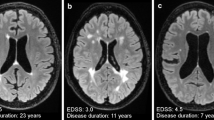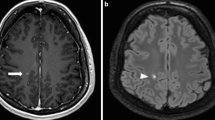Abstract.
This review summarizes the main contributions given by magnetic resonance imaging (MRI) to predict disease evolution in patients at presentation with clinically isolated syndromes (CIS) suggestive of multiple sclerosis (MS). In these patients, the extent of lesions on T2-weighted scans of the brain is a robust predictor of the subsequent development of clinically definite MS (CDMS), moderate to severe disability and new MRI lesions. The risk of developing CDMS in patients with CIS is further increased when some of these lesions are enhancing or when additional lesions are seen on T2-weighted scans of the spinal cord. Recent studies using new MRI techniques have shown that irreversible tissue disruption is an early event in the course of MS and that subtle normal-appearing white matter changes occur in patients with CIS and are associated with an increased risk of developing CDMS. These findings are changing our views of how to monitor early MS evolution and of early MS treatment strategy.
Similar content being viewed by others
Author information
Authors and Affiliations
Rights and permissions
About this article
Cite this article
Filippi, M. Magnetic resonance imaging findings predicting subsequent disease course in patients at presentation with clinically isolated syndromes suggestive of multiple sclerosis. Neurol Sci 22 (Suppl 2), S49–S51 (2001). https://doi.org/10.1007/s100720100033
Issue Date:
DOI: https://doi.org/10.1007/s100720100033




